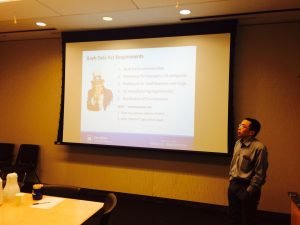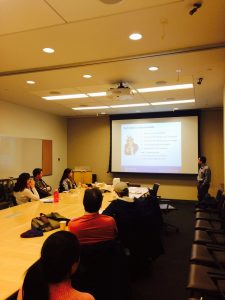By Xiaoyu Zh
As Graduate students, most of us have experience in TA, or mentoring undergraduates in the lab. If you happen to enjoy it, then congrats! You have one more good option for your future career: faculty at a liberal arts college, which allows you to teach and research at the same time. Then how do we prepare ourselves for this career path, and what to expect on this journey? As part of the Huck Graduate Student Advisory Committee’s (HGSAC) Career Exposure Seminar Series, we were honored to have Dr. Jill Keeney, a biology professor and the Department head of Juniata College, to share her experience from a graduate student to a leading faculty member.
honored to have Dr. Jill Keeney, a biology professor and the Department head of Juniata College, to share her experience from a graduate student to a leading faculty member.
Dr. Keeney received her BS from Penn State and her PhD from Washington University in St. Louis. She then did her postdoc in Johns Hopkins Medical School. Dr. Keeney is now the head of the Biology department at Juniata. In addition to teaching, Dr. Keeney runs a student centered research program, and has received grants for this endeavor from the National Institutes of Health and the National Science Foundation.
- What’s your educational background? Is there anything specific that prepared you for your current career?
BS in biochemistry from Penn state
Ph.D. in immunogenetics from Washington University in St. Louis
Postdoc in molecular genetics at Johns Hopkins university.
Mentoring undergraduates in the lab during graduate and postdoc work was helpful in getting me thinking about teaching undergraduates. I did not have any formal teaching experience before I applied to my current position.
- What are your current roles/responsibilities? How have these changed over time?
My current responsibilities are teaching, supervising students in research and department chair responsibilities. At a small school, department chair is a lot of detail oriented work on scheduling and budgets, as well as mentoring young faculty in teaching and research.
These have changed over time to be more administrative tasks and to be in a mentoring role for younger faculty. Additionally, I have taken on some other roles, such as co-chairing the college’s strategic planning committee, and taking a role in writing institutional grants.
- Was this career path something you had always considered?
No, this is not something that I have always considered. Honestly I didn’t give a lot of thought to where I would be headed finishing my Postdoc. During my Postdoc, some colleagues in the lab suggested that I consider teaching as a career. For my husband and I, the opportunity to not have to live in a big city but be able to live in a small town was a plus.
- What skills have made you and others in your field successful? Were there any unexpected skills that you needed to learn?
Not surprisingly, organization is a key skill. To be mentoring students in research, while also keeping courses well organized, keeping up with course content, and taking on administrative duties requires a lot of organization. One of the unexpected skills I had to learn is mentoring students in crisis about their college career or life. Also I had to learn the skill of managing interactions and conflicts between colleagues. Fortunately, in my department this has not been difficult.
- What’s the most challenging part of your career?
I think for me, the most challenging part of my career has been balancing what I wanted to do with my work and the challenges of my family. My husband had a fulltime career in medicine with a private practice. And one of our children is high functioning autistic. This required some extra time, energy and effort to manage during the school years. Sometimes, this was extremely challenging, trying to balance time for my career with what I felt was adequate time with my children. Now that my kids are in college or beyond, I’m trying to rebuild my research.
- How do you think your career will change in both the near and distant future?
With the increased cost of higher education, I think we may be fighting a push for larger classes, including larger laboratory sections. Also, departments may be asked to reduce in terms of supplies for laboratories, and there may also be less internal support available for research. With the increased cost of research, along with decreased funding, finding funding for undergraduate research may become increasingly more difficult. On the more positive side, the trend seems to be more students pursuing college degrees. Faculty may need to play an ever- increasing role in recruitment and in general education. This is a positive change.
- What can a young scientist do to position him or herself for a career as a liberal arts professor? Any tips on specific ways to network in the field?
I think the best way to prepare may be to connect with someone at a liberal arts college, and work with them to teach a short term module in one of their classes. Spending time developing a 2-3week module, that includes assessment, may be more advantageous than spending an entire semester teaching a course. This also allows some mentoring by the faculty member. The best way to make a connection, is to either attend the education session of major meetings, such as the American Society for Genetics, or to look for small schools nearby, which there are many in Pennsylvania, and email a faculty member asking is you could collaborate to produce a module for a class.
- If you weren’t at Juniata where do you think or where would you like to be?
I cannot imagine myself being anywhere other than juniata. I have enjoyed this career very much, although with my children and husbands career, I have not been able to keep up the research program that I had hoped for. Around the time I was interviewing at juniata, I had the opportunity to interview for a position at the University of Pennsylvania. I do not think I would’ve liked that kind of position. I really enjoy mentoring many different students.
- How easy/difficult is it to balance work and family life in your career as a liberal arts professor?
Because Huntingdon is a small town, balancing work and family life I think was easier than in a city because of the non-existent commute time. I have a 1.5 mile commute and my children’s schools are within walking distance of work. This allowed me to attend all school activities, including helping out with after school activities. This would be difficult in a larger city. Of course, many liberal arts colleges are located in larger towns or cities. Teaching has very intense times with slower times, but not having the research pressure has worked better for me. The teaching job requires a lot of “on” energy during the day, but I find it very rewarding. Finding childcare was a challenge, but that is true anywhere. The tuition exchange benefit is a huge plus.
- What advice do you have, about anything, for current graduate students?
Write a mission statement for yourself; what you would like to make as your priorities in life. Life has a way of just happening, and we tend to do what is most obvious or what those around us are doing, without really giving direct thought to what we would like to achieve in life.







